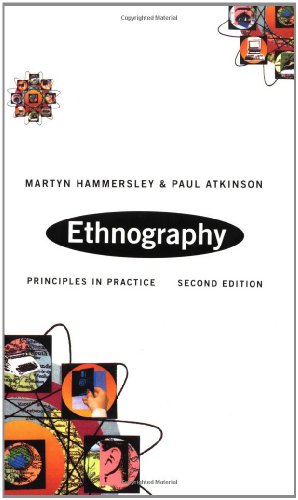
Synopsis
Thoroughly updated, this accessible introduction to the methods of ethnographic fieldwork reconsiders the status of ethnography and places it quite explicitly in a general methodological context.
"synopsis" may belong to another edition of this title.
About the Author
Martyn Hammersley is Professor of Educational and Social Research at the Open University. His early research was in the sociology of education, focusing in particular on teachers' perspectives, patterns of classroom interaction, and assessment regimes. More recently he has investigated the representation of social research findings in the mass media. His most recent books are Taking Sides in Social Research (2000), Educational Research: Policy Making and Practice (2002), and Media Bias in Reporting Social Research? (2006).
Paul Atkinson is Distinguished Research Professor of Sociology at Cardiff University, where he is Associate Director of the ESRC Centre for Economic and Social Aspects of Genomics. His main research interests include the sociology of cultural production, the sociology of medical knowleddge, with particular emphasis on the social consequences of new genetic technologies and the development of qualitative research methods, including applications of information technology. His most recent books have been Everyday Arias: An Operatic Ethnography (2005) and Interactionism with William Housley (2003). Together with Sara Delamont he edits the journal Qualitative Research.
Synopsis
Thoroughly updated and substantially rewritten the second edition of this popular textbook is now even more relevant and useful for students and researchers. New material includes a section on the use of micro computers in research and a new chapter on the ethics of research. Ethnography provides a systematic and coherent account of ethnographic principles and practice. Rejecting the over-simplified contrast between positivism' and 'naturalism', but also questioning more recent critiques of these positions, the authors argue that ethnography is best understood as a reflexive process. Above all, what this means is that we must recognise that social research is part of the world that it studies. From an outline of the principle of reflexivity in Chapter One, the authors go on to discuss and exemplify the main features of ethnographic work: * the selection and sampling of cases * the problems of access * observation and interviewing * recording and filing data * the process of data analysis and writing research reports There is also consideration of the ethical issues surrounding ethnographic research.
Throughout, the discussion draws on a wide range of illustrative material from classic and more recent studies in Britain, America and elsewhere."About this title" may belong to another edition of this title.
Other Popular Editions of the Same Title
Search results for Ethnography: Principles and Practice
Ethnography: Principles and Practice
Seller: World of Books (was SecondSale), Montgomery, IL, U.S.A.
Condition: Good. Item in good condition. Textbooks may not include supplemental items i.e. CDs, access codes etc. Seller Inventory # 00070840657
Ethnography: Principles and Practice
Seller: ThriftBooks-Dallas, Dallas, TX, U.S.A.
Paperback. Condition: Fair. No Jacket. Former library book; Readable copy. Pages may have considerable notes/highlighting. ~ ThriftBooks: Read More, Spend Less. Seller Inventory # G0415086647I5N10
Ethnography : Principles in Practice
Seller: Better World Books, Mishawaka, IN, U.S.A.
Condition: Good. 2nd. Used book that is in clean, average condition without any missing pages. Seller Inventory # GRP13743841
Ethnography : Principles in Practice
Seller: Better World Books, Mishawaka, IN, U.S.A.
Condition: Very Good. 2nd. Used book that is in excellent condition. May show signs of wear or have minor defects. Seller Inventory # GRP97880933
Ethnography: Principles and Practice
Seller: The Maryland Book Bank, Baltimore, MD, U.S.A.
paperback. Condition: Good. 2nd Edition. Corners are bent. Used - Good. Seller Inventory # 2--W-4-0611
Ethnography: Principles and Practice
Seller: AwesomeBooks, Wallingford, United Kingdom
Paperback. Condition: Very Good. Ethnography: Principles and Practice This book is in very good condition and will be shipped within 24 hours of ordering. The cover may have some limited signs of wear but the pages are clean, intact and the spine remains undamaged. This book has clearly been well maintained and looked after thus far. Money back guarantee if you are not satisfied. See all our books here, order more than 1 book and get discounted shipping. Seller Inventory # 7719-9780415086646
Ethnography: Principles and Practice: Principles in Practice
Seller: Bahamut Media, Reading, United Kingdom
Paperback. Condition: Very Good. This book is in very good condition and will be shipped within 24 hours of ordering. The cover may have some limited signs of wear but the pages are clean, intact and the spine remains undamaged. This book has clearly been well maintained and looked after thus far. Money back guarantee if you are not satisfied. See all our books here, order more than 1 book and get discounted shipping. Seller Inventory # 6545-9780415086646
Ethnography: Principles and Practice
Seller: Phatpocket Limited, Waltham Abbey, HERTS, United Kingdom
Condition: Acceptable. Used - Acceptable. Your purchase helps support Sri Lankan Children's Charity 'The Rainbow Centre'. Ex-library with wear and barcode page may have been removed. Our donations to The Rainbow Centre have helped provide an education and a safe haven to hundreds of children who live in appalling conditions. Seller Inventory # Z1-R-029-01820
Ethnography: Principles and Practice
Seller: Phatpocket Limited, Waltham Abbey, HERTS, United Kingdom
Condition: Good. Your purchase helps support Sri Lankan Children's Charity 'The Rainbow Centre'. Ex-library, so some stamps and wear, but in good overall condition. Our donations to The Rainbow Centre have helped provide an education and a safe haven to hundreds of children who live in appalling conditions. Seller Inventory # Z1-F-003-02010
Ethnography : Principles in Practice
Seller: Better World Books Ltd, Dunfermline, United Kingdom
Condition: Good. 2nd. Ships from the UK. Former library book; may include library markings. Used book that is in clean, average condition without any missing pages. Seller Inventory # GRP9794941

